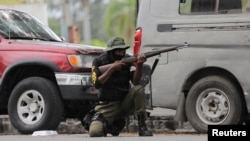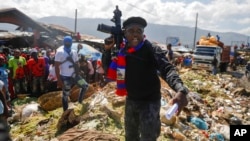The U.N. Security Council has unanimously imposed its first sanctions on Haiti in five years, targeting those fueling gang violence and worsening the economic, security and humanitarian situation in the Caribbean Island nation.
“We are sending a clear message to the bad actors that are holding Haiti hostage: The international community will not stand idly by while you wreak havoc on the Haitian people,” U.S. Ambassador Linda Thomas-Greenfield said after the vote.
The U.S. and Mexico drafted the resolution, which establishes for an initial period of one year a travel ban, asset freeze and arms embargo on persons or entities designated by a newly established Security Council sanctions committee.
The resolution targets those supporting or financing violence, kidnapping, sexual violence, arms or drug sales, people trafficking and the recruitment of children into gangs. Those obstructing the delivery and distribution of humanitarian aid can also be sanctioned. Haiti’s government supports the measures.
The U.N. says 60% of the capital, Port-au-Prince, is under the control or influence of heavily armed gangs. More than 1.5 million people in the country have been directly affected by gang violence, and 20,000 have fled their homes seeking safety.
This has worsened the already abysmal humanitarian situation affecting the availability of electricity, clean water, garbage collection and the ability of hospitals to operate. Hunger is rampant in Haiti, with an unprecedented 4.7 million people — more than a third of the population — experiencing emergency levels of acute food insecurity, including 19,000 people experiencing catastrophic levels of hunger.
“The council has given a clear signal that violence has to stop, and it cannot go unpunished,” Mexican Ambassador Juan Ramon Ramirez said.
The resolution names Jimmy Cherizier, also known as “Barbecue,” to be sanctioned.
The notorious gang leader participated in deadly attacks on civilians while he was a member of the Haitian National Police. The council says the coalition of gangs he currently presides over is responsible for blocking access to the Varreux terminal since mid-September — the country’s largest fuel facility — worsening the humanitarian situation.
The resolution also directs Secretary-General Antonio Guterres to appoint a panel of experts to report to the council on the situation, as well as recommend persons or entities who would meet the criteria to be sanctioned.
Sanctions are always an issue in the council, with some members like Russia and China, opposed to them in principle. But in this instance, China advocated for them, and Russia, after its initial reservations were addressed, supported them.
“Despite the support for the document, we aren’t convinced that international restrictive measures will be an appropriate response to the whole raft of complex problems in Haiti,” Russian Deputy Ambassador Dmitry Polyanskiy said.
He said a long-term solution must be found that includes a political process, socio-economic development, the eradication of poverty and inequality, and the strengthening of state institutions.
The council is also considering a request from Secretary-General Guterres to respond to a request from Haiti’s government and consider endorsing a non-U.N. international specialized armed force to address gang violence.
Haiti’s ambassador said the force would assist the Haitian National Police force and the council should seriously consider it.
“We are in a race against time,” Ambassador Antonio Rodrigue said. “This is because we are talking about a country which each day plunges further into violence and insecurity. We are talking about the lives of thousands of people here. Each day lost in terms of finding an appropriate response to the situation, means more and too many innocent victims suffer.”





